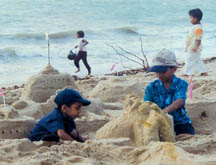|
observer |
|
|
|
|
|
OTHER LINKS |

|

|

|
Know your rightsThe CRC has 54 articles. Here are some of them:* All children have these rights whatever their age, gender, disability, colour, race, language or religion may be. States should protect children from all forms of discrimination and take action to promote their rights.
* All actions and decisions concerning children should take their best interests into consideration. * Governments must do all they can to make the rights in the CRC a reality. * Governments must respect the rights and responsibilities of parents and families to provide guidance appropriate to children's developing capacities. * Children have a right to life; states should ensure their survival and development.
* Every child has the right to a name from birth and be given a nationality. They have the right to know and to be cared for by their parents. * The state must protect a child's identity, and if necessary, re-establish the basic aspects of a child's identity. * The child shouldn't be separated from parents unless it's in his/her best interests. If parents are separated, the child has the right to maintain contact with both. * Children and parents have the right to leave any country and to enter their own, to be reunited or to maintain their relationship. * The state should try to prevent, and help to return, children who have been kidnapped or kept abroad by force, by a parent or another person. * Children have the right to express opinions and to have those opinions taken into consideration in matters affecting them. * They have the right to information and to give information to others and to express their views, unless this violates the rights of others.
* Every child has the freedom of thought, conscience and religion, subject to parental guidance and national law. * Children have the right to meet others and to join or set up associations, unless this violates the rights of others. * They have a right to be protected from interference with their privacy, family, home and correspondence. * States should ensure that children have access to information and materials from a range of local and international sources, especially those that aim at their well-being and respect their cultural background. * Both parents should have joint responsibility for bringing up their children.
* Children have a right to be protected from all forms of abuse and neglect, at the hands of parents or other people. * The state should ensure special protection to children living without their families. * Any adoption issues should be carried out legally and arranged in the best interests of the child. * A child living outside the home has the right to have all aspects of the placement evaluated regularly. * Refugee children who have left their countries due to lack of security should receive special protection and help. * Mentally or physically disabled children have a right to special care, education and training designed to help them become as self-reliant as possible and lead full and active lives. * They should have access to healthcare services. * The child has the right to benefit from social security provisions available in the country. * Children have the right to an adequate standard of living. If the parents cannot do this, the state should do so. * All children have a right to an education. States should ensure that primary education at least is compulsory and is offered free. * Education should prepare them to live responsibly and peacefully in a free society, having respect for basic human rights, their own cultural and national values as well as those of others. * Children of minority communities have a right to enjoy their own culture and practise their own religion and language. * Children have a right to leisure, play and to take part in cultural and artistic activities. * Children have a right to be protected from work that may be harmful to their health, education or development. * Children have the right to be protected from the use of illegal drugs and from being involved in their production or distribution. * Every child has the right to protection from sexual exploitation and abuse. * The state should make every effort to prevent the sale, trafficking and abduction of children. * No child should be tortured, punished or treated cruelly, given life imprisonment, be unlawfully arrested or deprived of their liberty. * Children have the right to protection in times of war. No child should be recruited to the armed forces or be allowed to take part in hostilities. * States should ensure that child victims of armed conflicts, torture, neglect, maltreatment or exploitation get suitable treatment to help them recover and lead a normal life. * Children accused of committing offenses have the right to legal and other assistance. |












